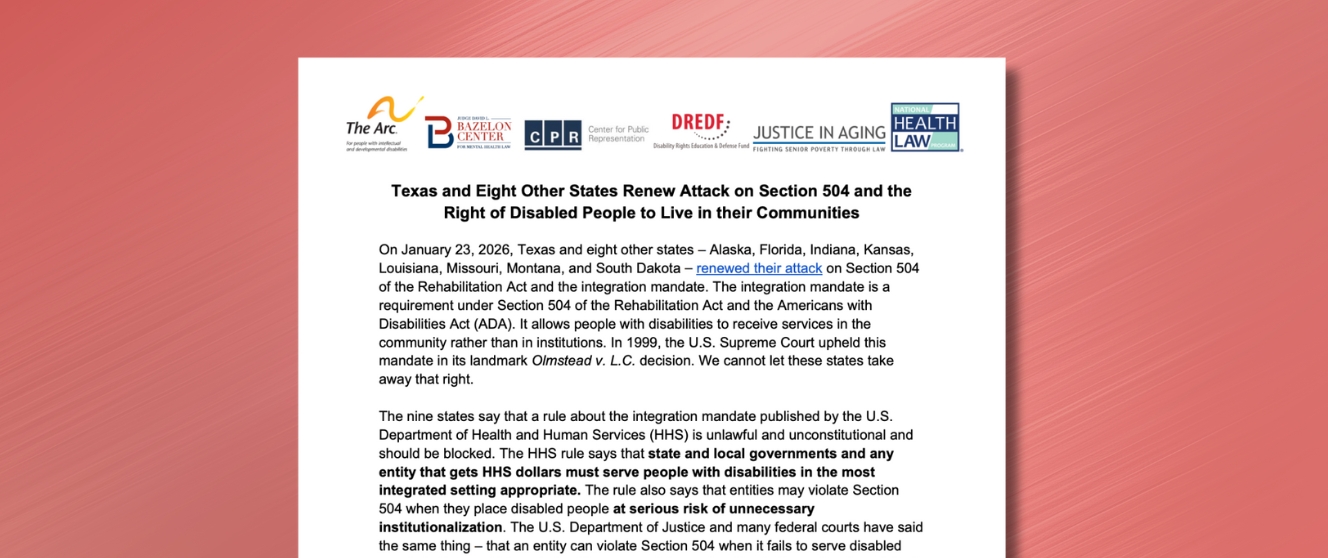
March 27, 2018
Via Electronic Submission (www.regulations.gov)
Secretary Alex Azar
U.S. Department of Health and Human Services
200 Independence Avenue, SW
Washington, DC 20201
Re: Comments on HHS proposed rule on Protecting Statutory Conscience
Rights in Health Care, HHS–OCR–2018–0002, RIN 0945-ZA03
Dear Secretary Azar:
Disability Rights Education and Defense Fund (DREDF) thanks you for the opportunity to submit comments on the Department of Health and Human Services’ proposed rule on Protecting Statutory Conscience Rights in Health Care (proposed rule). DREDF is a national cross-disability law and policy center that protects and advances the civil and human rights of people with disabilities through legal advocacy, training, education, and development of legislation and public policy. We are committed to increasing accessible and equally effective healthcare for people with disabilities and eliminating persistent health disparities that affect the length and quality of their lives.
Healthcare is not simply a consumer good. Everyone needs some degree of healthcare at some point in their lives. Disabilities and health conditions that affect functional ability arise from every facet of human interaction, or the mere reality of aging. People with disabilities and chronic conditions require equal access to quality healthcare in their communities to exercise their civil right to fully participate in all aspects of American society. As longtime advocates for the disability community in the arena of healthcare, we are alarmed by the vagueness and potential reach of the proposed rule’s provisions as they intersect with civil rights laws including the Americans with Disabilities Act (ADA), Section 504 of the Rehabilitation Act of 1973 (Section 504), and Section 1557 of the Patient Protection and Affordable Care Act (Section 1557). The proposed broadly requirements and prohibitions of 45 C.F.R. § 88.3 prioritize the rights of personnel and entities involved with any health-related service, from research to insurance to third-party administration, to refuse to perform or assist with any lawful health service for “religious, moral, ethical or other reasons.”
DREDF appreciates the proposed rule’s argument on behalf of the conscience rights of healthcare entities, but emphasizes that those rights must be read in concert with this country’s commitment to the right of people with disabilities, across a full range of race, ethnicity, age, sexual orientation and gender identity, to receive health care services free of discrimination. Congress provided a “broad mandate” in the ADA and Section 504 “to remedy widespread discrimination against disabled individuals.”[1] The ADA was designed “to provide clear, strong, consistent, enforceable standards addressing discrimination against individuals with disabilities.”[2] The ADA unquestionably applies to the private offices of healthcare provides, hospitals, and any state or locally operated healthcare entity, and Section 504 applies to all entities that receive federal financial assistance or are federally operated. Section 1557 broadly extended Section 504’s non-discrimination mandate to private insurers. Conscience rights, regardless of the sincerity with which they are held, cannot be used as a shield for discrimination that would deprive people with disabilities of equal access to healthcare.
Discrimination in the provision of health care based on religious grounds presents particular concerns for people with disabilities for both historic and practical reasons. Historically, people with disabilities have been subject to many stereotypes including religious beliefs that disability arises from demonic possession or a curse.[3] Those early stereotypes gave way to assumptions eugenic assumptions about who was “fit” to reproduce and many state laws that sterilized people with disabilities without their consent; California’s eugenics laws stayed on the books until 1979.[4] While hopefully few current healthcare providers may hold overt beliefs about demonic possession or eugenics, different religious beliefs can easily influence assumptions about the “childlike nature” and capacities of people with disabilities, their quality of life, their ambitions, and their freedom and capacity to make autonomous choices and take risks.
Practically, people with disabilities as a group are subject to higher unemployment and lower socio-economic status. Many people with disabilities rely heavily on religiously affiliated service providers for daily supports as well as ongoing healthcare services. In fact, many people with disabilities have little choice but to receive needed services from such service providers. And those service providers—particularly residential providers—are frequently responsible for assisting with many aspects of a person’s life and the activities to which they have access.
People with disabilities have sometimes been excluded from needed services or faced barriers to receiving those services due to service provider objections. For example, group homes have sometimes refused to allow people with disabilities to live with their spouses or romantic partners – even in the case of a heterosexual married couple.[5] Recent federal regulations concerning Medicaid home and community-based services now more clearly require residential service providers for people with disabilities that receive federal funds to allow choice of roommate and overnight visitors.[6] Allowing religiously-affiliated service providers to deny residential services to people with disabilities based on a religious objection such as this could dramatically undermine their clients’ right to pursue relationships and exercise fundamental rights of association.
The breadth of application of the proposed rule might also be interpreted to mean that the service providers on whom people with disabilities rely to coordinate necessary services or to provide transportation, personal care services, or other key services could refuse to provide these services, even if the person is entitled to receive them through Medicaid, Medicare, or another program. For example, these provisions might permit a case manager to refuse to set up a medical appointment for a person with a disability to see a gynecologist if contraceptives might be discussed, might permit a personal care services provider to refuse to assist a person with a disability in performing parenting tasks because the person was married to someone of the same gender, might permit a mental health service provider to refuse to provide needed treatment to an individual based on the fact that the individual was transgender, and might permit a sign language interpreter to refuse to help a person communicate with a doctor about sexual health. As these examples demonstrate, a denial of service based on a provider’s personal moral objection can potentially impact every facet of life for a person with disabilities – including autonomy, parental rights, and access to the community.
Since the proposed rule encompasses referral and the giving of information, people with disabilities can be denied both the option of assistance finding needed healthcare services somewhere else, or left not even knowing that they have been given incomplete information. In many rural areas, and even in some urban areas of the country that have a very high cost of living, it can be extremely difficult for people with disabilities to find personal care assistants. Will a personal care assistant, or a care agency, with sincerely held religious beliefs be able to refuse to assist their client with activities that the assistant disapproves of, such as watching certain movies or meeting with certain friends because they believe such activities are morally wrong? If a person with a disability attempts to find another care assistant, can the current assistant choose to simply not communicate the fact that other applicants are seeking the position? The department’s failure to specify in the proposed rule that healthcare entities cannot exercise their conscience rights over a disabled person’s right to receive healthcare services free of discrimination leaves people with disabilities in an extremely vulnerable situation, potentially unable to rely on the very agency, HHS Office for Civil Rights,that should be protecting them from discrimination.
In addition, individuals with particular disabilities have historically faced particular discrimination on the basis of religious beliefs.[7] Cases abound where religious scruples have been invoked to deny services to HIV-infected people; as recently as 2009, pharmacists unsuccessfully challenged a Washington law prohibiting pharmacies from refusing to deliver lawfully prescribed or approved medicines.[8] This is also an extremely relevant issue for the disability community since 4.6 percent of Deaf people are infected with HIV/AIDS, four times the rate for the African-American population,[9] the most at-risk racial group in the U.S.[10]
People with disabilities not only experience health disparities themselves, but those disparities are compounded by the health disparities that they face as members of other demographic groups such as women, people of color, and LGBTQ people. While disability affects people of all races, ethnicities, genders, languages, sexual orientations, and gender identities, disability does not occur uniformly among racial and ethnic groups. Disability prevalence is highest among African Americans, who report disability at 20.5 percent compared to 19.7 percent for non-Hispanic whites, 13.1 percent for Hispanics/Latinos and 12.4 percent of Asian Americans.[11] Disability prevalence among American Indians and Alaskan Natives is 16.3 percent.[12] One Institute of Medicine report has already observed that there are “clear racial differences in medical service utilization rates of people with disabilities that were not explained by socioeconomic variables,” and “persistent effects of race/ethnicity [in medical service utilization] could be the result of culture, class, and/or discrimination.”[13] Another recent paper commissioned by the National Academies of Sciences, Engineering and Medicine found that “[c]onscious and unconscious biases and stereotypes among health care providers and public health practitioners about specific racial and ethnic groups, and people with disabilities, contribute to observable differences in the quality of health care and adverse health outcomes among individual within those groups.”[14] These compounded disparities place people with disabilities at greater risk of denials of needed health care.
Title III of the ADA already exempts from coverage “religious entities or entities controlled by religious organizations, including places of worship.”[15] The sweeping language of the proposed rule has the potential to create conflicts with Title III and to preempt enforcement of similar state and local laws protecting people with disabilities.
Finally, we note that the proposed rule provides HHS OCR with the following authority:
(c) Periodic compliance reviews. OCR may from time to time conduct compliance reviews or use other similar procedures as necessary to permit OCR to investigate and review the practices of the Department, Department components, recipients, and subrecipients to determine whether they are complying with Federal health care conscience and associated antidiscrimination laws and this part. OCR may conduct these reviews in the absence of a complaint.
DREDF strongly submits that that HHS OCR’s authority to conduct compliance reviews in the absence of a complaint must be available not only when OCR enforces conscience rights on behalf of providers and other healthcare entities, but equally available to those groups which are protected from non-discrimination in healthcare, including people with disabilities.
For the foregoing reasons, DREDF urges you to revise the proposed rule to ensure that the religious refusal provisions are not interpreted to preempt civil rights protections. Please feel free to contact me if you have any questions or comments concerning the above.
Sincerely,

Silvia Yee
Senior Staff Attorney
[1] PGA Tour, Inc. v. Martin, 532 U.S. 661, 674 (2001).
[2] 42 U.S.C. § 12101(b)(2) (emphasis added). Section 504 contains virtually identical requirements.
[3] Chomba Wa Munyi, “Past and Present Perceptions Towards Disability: A Historical Perspective,” Disability Studies Quarterly 32:2 (2012), available at: http://dsq-sds.org/article/view/3197/3068.
[4] A. M. Stern, Eugenic Nation: Faults and Frontiers of Better Breeding in Modern America, American Crossroads (2015).
[5] See Forziano v. Independent Grp. Home Livin Prog., No. 13-cv-00370 (E.D.N.Y. Mar. 26, 2014) (dismissing lawsuit against group homes, including a religiously affiliated group home, that refused to allow married couple with intellectual disabilities live together).
[6] 42 C.F.R. §§ 441.710(a)(vi)(B)(2), 441.710(a)(vi)(D).
[7] National Women’s Law Center, Fact Sheet: Health Care Refusals Harm Patients: The Threat to LGBT People and Individuals Living with HIV/AIDS, (May 2014), available at https://nwlc.org/wp-content/uploads/2015/08/lgbt_refusals_factsheet_05-09-14.pdf.
[8] Stormans, Inc. v. Selecky, 586 F.3d 1109, 1116 n.7 (9th Cir. 2009)
[9] Disability Policy Consortium, Seth Curtis and Dennis Heaphy, Disabilities and Disparities: Executive Summary 3 (March 2009).
[10] Id.
[11] U.S. Census Bureau, Matthew Brault, Americans With Disabilities: 2005, Current Population Reports 117 (2008). Many of the differences between the disability rates by race and Hispanic origin can be attributed to differences in the age distributions of their populations. For example, Hispanics are predominantly younger than non-Hispanic whites.
[12] U.S. Census Bureau, 2009 American Community Survey, S1810, Disability Characteristics 1 year estimates (2009) http://factfinder.census.gov/servlet/STTable?_bm=y&¬qr_name=ACS_2009_1YR_G00_S1810&-geo_id=01000US&¬ds_name=ACS_2009_1YR_G00_&-_lang=en&- format=&-CONTEXT=st.
[13] Institute of Medicine, The Future of Disability in America 92 (2007).
[14] S. Yee, M. L. Breslin, T. D. Goode, S.M. Havercamp, W. Horner-Johnson, L. I. Iezzoni, G. Krahn, Compounded Disparities: Health Equity at the Intersection of Disability, Race, and Ethnicity; commissioned by the National Academy of Medicine of the National Academies of Sciences, Engineering and Medicine (2017).
[15] 42 U.S.C. § 12187.

